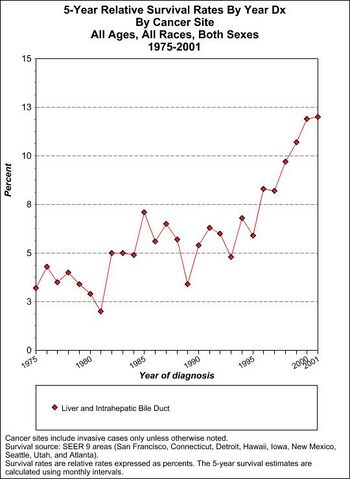Hepatocellular cancer: Difference between revisions
imported>Anthony.Sebastian |
imported>Anthony.Sebastian (add lede pgraphs; use reflist for references) |
||
| Line 1: | Line 1: | ||
{{subpages}} | {{subpages}} | ||
<b>Hepatocellular cancer</b>— commonly referred to as ‘hepatocellular carcinoma’, and sometimes ‘liver cancer’, ‘hepatic cancer’, or ‘hepatoma’—is a malignant growth of epithelial cells (i.e., a carcinoma) developing as a primary cancer within the tissues of the liver, as opposed to cancers having migrating (metastasizing) there from another organ or tissue. | |||
A 2011 review in the ''New England Journal of Medicine'' summarizes the factors that increase the risk of someone developing hepatocellular carcinoma: | |||
{|align="center" style="width:85%;font-size:98%;" | |||
| | |||
<font face="Gill Sans MT">Major risk factors for hepatocellular carcinoma include infection [of the liver] with HBV [Hepatitis B virus] or HCV [Hepatitis C viruss], alcoholic liver disease, and most probably nonalcoholic fatty liver disease. Less common causes include hereditary hemochromatosis, alpha1-antitrypsin deficiency, autoimmune hepatitis, some porphyrias, and Wilson’s disease. The distribution of these risk factors among patients with hepatocellular carcinoma is highly variable, depending on geographic region and race or ethnic group…Most of these risk factors lead to the formation and progression of cirrhosis, which is present in 80 to 90% of patients with hepatocellular carcinoma.</font> <ref name=elserag2011/> | |||
|} | |||
==Diagnosis== | ==Diagnosis== | ||
| Line 21: | Line 29: | ||
==References cited== | ==References cited== | ||
{{reflist3 test|refs= | {{reflist3 test|refs= | ||
<ref name=elserag2011>El-Serag HB. (2011) [http://dx.doi.org/10.1056/NEJMra1001683 Hepatocellular Carcinoma]. Review Article. ''N.Engl.J.Med.'' 365(12):1118-1127. | 56 references.</ref> | |||
<ref name="pmid11350553">{{cite journal| author=Tong MJ, Blatt LM, Kao VW| title=Surveillance for hepatocellular carcinoma in patients with chronic viral hepatitis in the United States of America. | journal=J Gastroenterol Hepatol | year= 2001 | volume= 16 | issue= 5 | pages= 553-9 | pmid=11350553 | <ref name="pmid11350553">{{cite journal| author=Tong MJ, Blatt LM, Kao VW| title=Surveillance for hepatocellular carcinoma in patients with chronic viral hepatitis in the United States of America. | journal=J Gastroenterol Hepatol | year= 2001 | volume= 16 | issue= 5 | pages= 553-9 | pmid=11350553 | ||
Revision as of 15:40, 19 October 2011
Hepatocellular cancer— commonly referred to as ‘hepatocellular carcinoma’, and sometimes ‘liver cancer’, ‘hepatic cancer’, or ‘hepatoma’—is a malignant growth of epithelial cells (i.e., a carcinoma) developing as a primary cancer within the tissues of the liver, as opposed to cancers having migrating (metastasizing) there from another organ or tissue.
A 2011 review in the New England Journal of Medicine summarizes the factors that increase the risk of someone developing hepatocellular carcinoma:
|
Major risk factors for hepatocellular carcinoma include infection [of the liver] with HBV [Hepatitis B virus] or HCV [Hepatitis C viruss], alcoholic liver disease, and most probably nonalcoholic fatty liver disease. Less common causes include hereditary hemochromatosis, alpha1-antitrypsin deficiency, autoimmune hepatitis, some porphyrias, and Wilson’s disease. The distribution of these risk factors among patients with hepatocellular carcinoma is highly variable, depending on geographic region and race or ethnic group…Most of these risk factors lead to the formation and progression of cirrhosis, which is present in 80 to 90% of patients with hepatocellular carcinoma. [1] |
Diagnosis
The alpha-fetoprotein may be elevated; however, its positive predictive value is low and it may be elevated in patients with cirrhosis.[2]
Treatment
Hepatocellular cancer treatment information from the National Cancer Institute's Physician Data Query
Prognosis
Staging information
Hepatocellular cancer staging information from the National Cancer Institute's Physician Data Query
Screening
"Surveillance is deemed cost-effective if the expected HCC risk exceeds 1.5% per year in patients with hepatitis C and 0.2% per year in patients with hepatitis B. Analysis of recent studies show that alpha-fetoprotein determination lacks adequate sensitivity and specificity for effective surveillance (and for diagnosis). Thus, surveillance has to be based on ultrasound examination. The recommended screening interval is 6 months" according to a clinical practice guideline by the American Association for the Study of Liver Diseases. [3] "In a mixed-aetiology cohort, the most effective surveillance strategy is to screen each patient with AFP assay and ultrasound imaging on a 6-monthly basis" according to a systematic review by the NIHR Health Technology Assessment programme (UK). [4] In a randomized controlled trial, the relative risk ratio of biannual alpha-fetoprotein and ultrasonography, as compared to no screening, for mortality from hepatocellular carcinoma was 0.6 and the relative risk reduction was 36.7%. In populations similar to those in this study which had a rate of risk as measured by the mortality from hepatocellular carcinoma of 0.1315% without treatment, the number needed to treat is 2070. [5]
References cited
- ↑ El-Serag HB. (2011) Hepatocellular Carcinoma. Review Article. N.Engl.J.Med. 365(12):1118-1127. | 56 references.
- ↑ Tong MJ, Blatt LM, Kao VW (2001). "Surveillance for hepatocellular carcinoma in patients with chronic viral hepatitis in the United States of America.". J Gastroenterol Hepatol 16 (5): 553-9. PMID 11350553.
- ↑ Bruix J, Sherman M, American Association for the Study of Liver Diseases (2011). "Management of hepatocellular carcinoma: an update.". Hepatology 53 (3): 1020-2. DOI:10.1002/hep.24199. PMID 21374666. PMC PMC3084991. Research Blogging.
- ↑ Thompson Coon J, Rogers G, Hewson P, Wright D, Anderson R, Cramp M et al. (2007). "Surveillance of cirrhosis for hepatocellular carcinoma: systematic review and economic analysis.". Health Technol Assess 11 (34): 1-206. PMID 17767898. [e]
- ↑ Zhang BH, Yang BH, Tang ZY (2004). "Randomized controlled trial of screening for hepatocellular carcinoma.". J Cancer Res Clin Oncol 130 (7): 417-22. DOI:10.1007/s00432-004-0552-0. PMID 15042359. Research Blogging.
